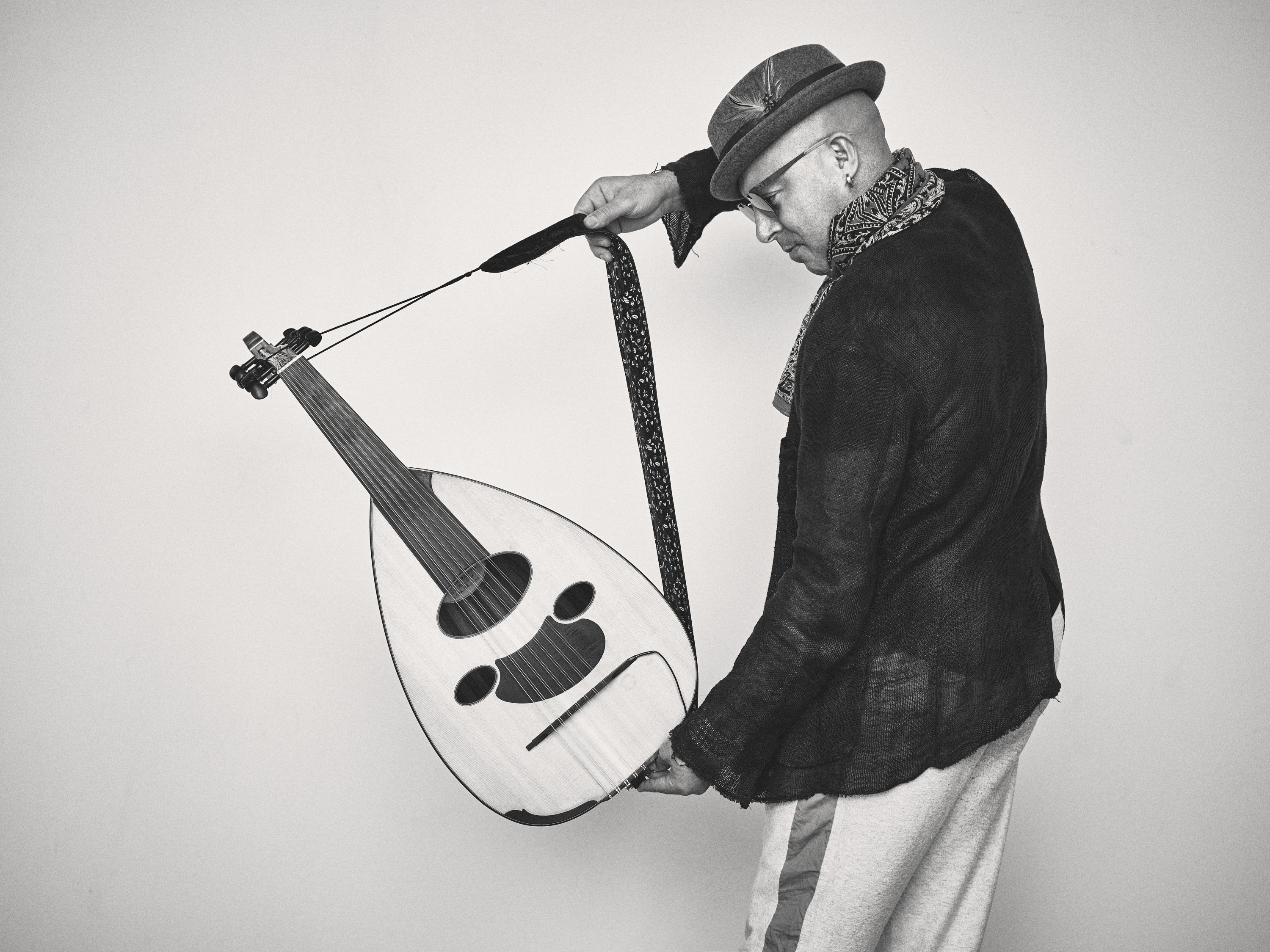© Turkuvaz Haberleşme ve Yayıncılık 2025
The Beyoğlu Culture Road Festival continues to put on glorious events for Istanbulites to attend across a number of venues, cultural centers and museums along a nearly 3.5-kilometer (2-mile) route. Among the festival spaces, the iconic Atatürk Cultural Center (AKM) offers an exciting program featuring a broad selection from opera to digital arts, cinema events and interviews. The latest event to take place at the AKM is a gig by Tunisian oud master Dhafer Youssef, who promises to masterfully blend jazz, Indian and electronic music for listeners.
Youssef was born in 1967 in Teboulba to a modest family coming from a long line of muezzins whose job is to recite the call to prayer. The artist said that his family expected him to get a job with a fixed salary. Since they were conservative, making music and chasing a career in this field was not easy for them to accept, according to Youssef. However, he discovered his voice thanks to his family, ironically.
The first time he became aware of his voice was when his grandfather initiated him to Quranic recitals. The local muezzin then encouraged him to record the adhan, or call to prayer, for their village. Noting that he recited the call using a cheap, plastic microphone, Youssef remembers it sounding like a distorted electric guitar. Feeling as if his call to prayer could appeal to Jimi Hendrix, he said this was the very first time he heard an electro sound and was also his first encounter with an audience. This is why this experience is still alive in his memory even after seven studio albums and hundreds of live performances around the world.
After all, despite his father’s objections, Youssef managed to follow his dreams, particularly thanks to the support of his mother and sister. After moving to the capital Tunis and attending the musical conservatory, he then went to Vienna for better musical training. “My older sister was working in a manufacturer day and night and sending me all that she earns to help me not to give up when I arrived in Vienna. So it’s never enough to thank my mom and my sister,” he said.
It was his first time in Europe, and he arrived in the city with a backpack and the equivalent of 20 euros ($21) in today’s money, according to him. “I had no friends or family or people I know. I had to build everything from nothing. However, I had a dream and had nothing to lose anyway. I was thirsty for music, for discovering, and for connecting with people. The dream of making music made me survive,” he said about his days in Vienna.
Youssef grew up listening to Sufi music in his family house. Revealing that he never thought that it would affect his music much and become a big part of him, he said that he loves the mystical side of Sufi music, which he found later in jazz as well.

In Vienna, a world of opportunities welcomed Youssef. In 1996, he released his first studio album “Musafir,” which means "the traveler" in Arabic. Performing this album at popular Viennese club Porgy & Bess, the artist was offered carte blanche and launched a series of monthly concerts at the club.
While he was gaining experience with his performances, Youssef released his second album “Malak,” in which he combined European jazz melodic structures with Mediterranean grooves of a particular form. The artist then went on a successful European tour.
Then in 2001, Youssef recorded “Electric Sufi.” Youssef said that this album was dedicated to the period of his life when he was recording the adhan for the village people and listening to Sufi music with his family. The jazzy music of this album was an opportunity for the artist to experiment with his voice and use it further as an instrument.
Back in the studio in 2003, Youssef recorded “Digital Prophecy,” in which he united the oud and electronic sound in an organic and harmonious way. “Divine Shadows,” in which he used more string instruments, followed later. In his sixth album, Youssef focused on Persian poet Abu Nawas, who was the foremost representative of the modern poetry in the eighth century. In “Abu Nawas Rhapsody,” released in 2010, he goes back to a more jazz and groove style.
Youssef has collaborated with many artists of plural origins throughout his career. The artist, who has always searched for renewal, improved himself with artistic exchanges. In 2011, he invited Turkish clarinetist Hüsnü Şenlendirici and Kanun player Aytaç Doğan to a performance in Germany. In 2013, inspired by this encounter, Youssef released "Birds Requiem." The success of this album immediately praised by critics was unprecedented, with a triumphant international tour of about 100 concerts, over 50,000 records sold and performances by several orchestras including the London Symphony Orchestra.
Youssef has also performed for Turkish listeners in the past. Noting that his music is like Turkish people, that is, it is between Occident and Orient, mixed together, he said: “When Turkish audiences listen to me it is like listening to themselves, it’s like when you see a painting and you feel like you are the one who did the painting. My music for the Turkish public is exactly feeling at home. This applies also to me as well, and I feel at home when I play in front of them. I feel like I’m playing for family, for my home people. What sets Turkish listeners from Western ones is that they share the deep feeling of the Orient with me. My music makes Turkish listeners feel goosebumps at the same time.”
Youssef will perform for fans at AKM this Friday at 9 p.m. The tickets for his concert can be purchased from biletinial.com. To take a journey between the Orient and Occident, do not miss the gig!
